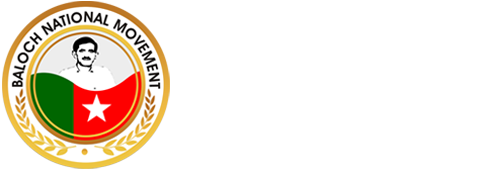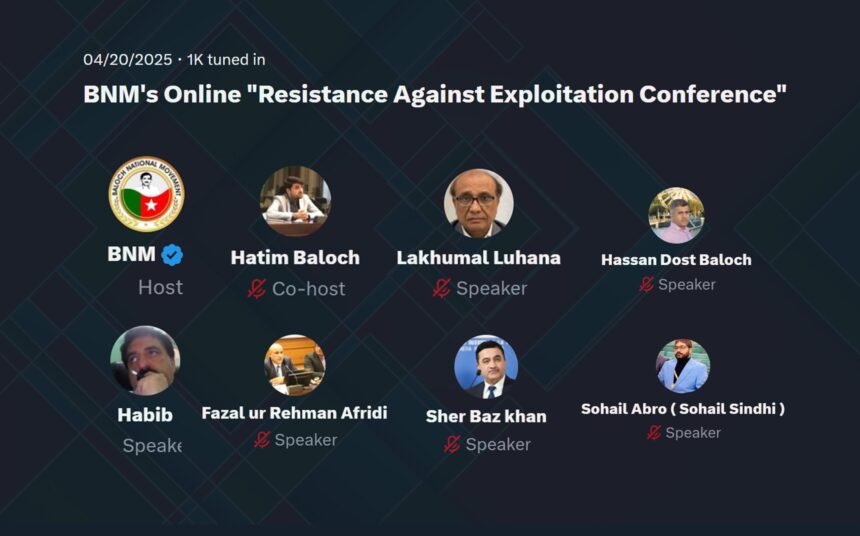Under the banner of the Baloch National Movement (BNM), a multinational conference was held that brought together leaders and representatives of nationalist parties from Balochistan, Sindh, Pashtunkhwa, Kashmir, and Gilgit-Baltistan. The central aim of the conference was to formulate a unified political and diplomatic strategy against the ongoing colonial policies of the Pakistani state, including the plunder of natural resources, forced occupation, and systematic human rights violations in these regions.
Speakers at the event included BNM’s Junior Joint Secretary Hasan Dost Baloch, Dr. Lakhu Lohana of the World Sindhi Congress, Habib ur Rehman of the Jammu Kashmir People’s National Party, Fazal ur Rehman Afridi from the Pashtun Tahafuz Movement (PTM), Sherbaz from the Awami Workers Party Gilgit-Baltistan, and Sohail Abro representing the Jeay Sindh Freedom Movement. Each speaker addressed in detail the issues of state repression, enforced disappearances, economic exploitation, and cultural aggression, calling for greater unity and collective resistance among oppressed nations. The conference was moderated by Hatim Baloch, a member of BNM’s Central Committee, while the party’s Secretary for Culture and Information, Qazi Dad Mohammad Rehan, presented the resolution.
In their remarks, speakers emphasized that Pakistan has now become a “strategic sandwich” between China and the United States, with both global powers eyeing the region’s natural resources. This situation, they warned, would only deepen the crisis for the oppressed peoples. The benefits of such exploitation, they added, are reserved exclusively for the ruling elite, particularly the military establishment, while the common people—including those from Punjab—remain marginalized. They called for greater political awareness, organization, and diplomatic engagement among the oppressed nations to counter this growing threat.
Representatives from Sindh described their homeland as wealthy yet enslaved, highlighting that despite producing 63% of Pakistan’s natural gas, thousands of tons of coal, and thousands of barrels of crude oil daily, Sindh receives only death, enforced disappearances, and forced religious conversions in return. They demanded the restoration of Sindh’s sovereignty, liberation from Rawalpindi’s occupation, and an end to cultural and religious oppression. Similarly, the speakers lamented that Balochistan’s ports, minerals, and lands have been handed over to non-local companies, while the Baloch population is forcibly silenced by state power. They pointed to projects such as Rekodik, Saindik, and Gwadar, which have been imposed without local consent, resulting not only in economic devastation but also in a severe threat to Baloch cultural identity and existence.
Criticizing the Pakistani state’s colonial mode of governance, the speakers denounced the daily violations of human rights, suppression of political voices, and theft of natural resources. They appealed to international institutions not to remain silent in the face of such oppression, warning that silence amounts to complicity in these crimes. The conference concluded with the adoption of a joint resolution which strongly rejected the construction of six new canals on the Indus River, the formation of police units made up of ex-military personnel in Kashmir, and the continuation of mega-projects such as CPEC, Rekodik, and Saindik in Balochistan, deeming all of these initiatives to be against the public interest. The resolution asserted that it was not a mere ceremonial document but a practical declaration of resistance, and that action would be taken at every platform against these exploitative plans.
The conference also highlighted similar patterns of resource exploitation and state repression in Gilgit-Baltistan and Kashmir, underlining that oppressed nations across all regions of Pakistan are subjected to uniform brutality. It was further stressed that international states, organizations, and corporations must avoid participating in these exploitative ventures, lest they find themselves complicit in crimes against oppressed nations. The leaders present at the conference unanimously pledged to make their future struggles stronger, more coordinated, and unified to ensure that the oppressed nations reclaim their rights, freedom, and sovereignty.


